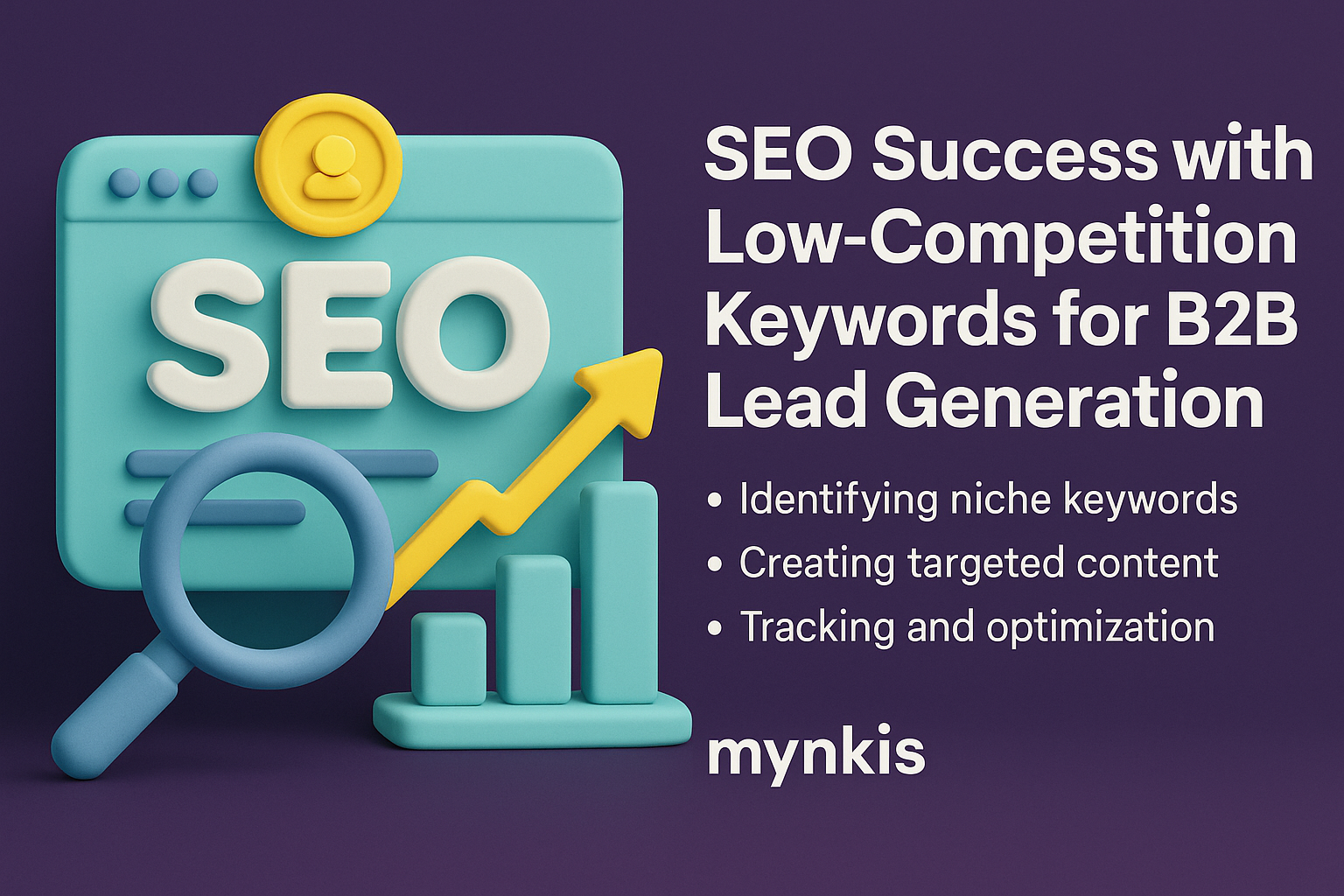Schedule a Demo
Low competition keywords represent a golden opportunity in the world of SEO for firms eager to boost their B2B lead generation. These keywords face less competition, making them easier to rank for and allowing your site to achieve higher visibility with less effort. In my years assisting businesses across various sectors, I've seen firsthand how focusing on these keywords can lead to significant traffic increases without the need for an expansive budget or extensive SEO resources.
Quick wins in SEO are essential for businesses, especially those with finite resources. Targeting low competition keywords allows companies to see rapid improvements in their search rankings and, subsequently, in their lead generation efforts. From my experience, these quick victories not only boost morale within the marketing team but also help secure further investment in SEO strategies. Achieving these wins can set the foundation for more ambitious SEO goals down the line.
The first step in leveraging low competition keywords is, of course, identifying them. Tools like Google's Keyword Planner, SEMrush, and Ahrefs can be instrumental in this process. I recommend starting with a broad list of potential keywords related to your services or products, then filtering them based on metrics such as search volume, keyword difficulty, and competition level. This refined list will serve as your target for optimization efforts.
Once you've pinpointed your low competition keywords, the next step is weaving them into high-quality, relevant content. From my observations, articles that genuinely answer searcher intent while incorporating these keywords tend to rank higher and convert better. Whether it's through blog posts, detailed guides, or case studies, content should provide value to your audience and seamlessly integrate these keywords for optimal SEO performance.
Long-tail keywords are a subset of low competition keywords that can significantly enhance your SEO strategy for B2B lead generation. These longer, more specific phrases attract highly targeted traffic. For example, instead of targeting "software development," consider "custom enterprise software solutions for financial sectors." I've always found that these keywords not only result in less competition but also have a higher conversion rate due to their specificity.
Revitalizing existing content by incorporating low competition keywords can also yield impressive results. In my work with companies looking to boost their lead generation, I've found that revising old but still relevant content to include these keywords can dramatically improve its SEO performance. Updating articles to reflect new keywords doesn't just improve search rankings; it also keeps your content fresh and engaging for return visitors.
SEO is not a set-it-and-forget-it endeavor; constant monitoring and adjusting are key. I suggest regularly reviewing the performance of your targeted low competition keywords. Use analytics tools to track changes in ranking and traffic related to these keywords. This data can help you refine your approach, identifying which keywords continue to be low competition and which ones may be trending toward increased competition.
Technical SEO plays a crucial role in supporting your keyword strategy. Ensuring that your site is technically sound can magnify the impact of targeting low competition keywords. Aspects like site speed, mobile responsiveness, and proper use of structured data enhance your site's ability to rank well for these keywords. In my consultations with businesses, I've noticed that even the best keyword strategy can falter without a solid technical foundation.
While low competition keywords offer quick wins, balancing them with higher volume keywords can lead to long-term SEO success. In my approach, I encourage clients to pursue a mix of both, leveraging the quick gains from low competition keywords while also aiming for the broader traffic potential of higher volume keywords. This balance ensures sustained growth in both traffic and leads over time.
According to insights from Moz, a leading authority in SEO, understanding keyword competition involves looking beyond just the surface-level metrics. They emphasize the importance of considering user intent and searcher satisfaction metrics like dwell time and bounce rate. My work reflects this approach, constantly striving to align content with what users are truly seeking when they type those specific keywords into their search engines.
I've been part of projects where focusing on low competition keywords has transformed a company's lead generation. For instance, one B2B tech firm we worked with aimed at niche software solutions for renewable energy companies. By targeting specific long-tail keywords such as "best software for solar installation companies," they not only climbed to the top of search results rapidly but also saw an impressive increase in qualified leads from the industry.
For firms operating within specific locales or targeting regional B2B clients, local SEO paired with low competition keywords can be highly effective. I've seen businesses thrive by optimizing for terms like "B2B marketing solutions in San Francisco" or "custom software development for businesses in Boston." This strategy capitalizes on lower competition within geographical segments, driving relevant local traffic to B2B websites.
As search algorithms continue to evolve, the landscape of keyword competition is constantly shifting. What's considered low competition today might change in the future due to new entrants or shifts in searcher behavior. Staying ahead means continually researching trends and adjusting your keyword strategy accordingly. I encourage all firms to keep a flexible, data-driven approach to their SEO, especially in areas like B2B lead generation.
Targeting low competition keywords offers a practical route to improving SEO and generating B2B leads quickly. Through a strategic mix of keyword research, content optimization, and ongoing monitoring, firms can leverage these keywords to their advantage. Drawing on personal experiences and expert insights, coupled with a solid understanding of technical SEO and future trends, businesses can secure meaningful SEO wins that contribute directly to their bottom line.
